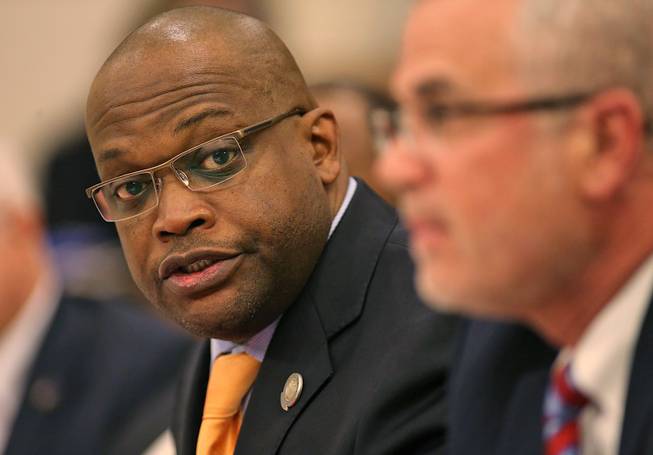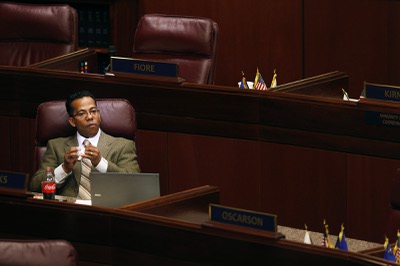
ASSOCIATED PRESS
Nevada Assemblyman William Horne, D-Las Vegas, speaks in a hearing at the Carson City Courthouse on Tuesday, March 26, 2013.
Sunday, March 31, 2013 | 2 a.m.
One word can no longer be used to describe the Nevada Legislature ousting one of its members: unprecedented.
But what kind of a precedent did lawmakers set with the expulsion Thursday of former Assemblyman Steven Brooks?
Assembly leaders and their lawyers took care in crafting procedure to give Brooks, a Democrat who served North Las Vegas, plenty of opportunity for due process. They named a select committee, hired a special independent counsel who conducted an investigation, reviewed the evidence and held a vote to expel him.
Brooks was invited to participate but declined. The report and the evidence against him were shared with his lawyer, who attended the committee hearing to present a defense.
But while the mechanics of the process were transparent, the evidence and the reasons for determining Brooks should be expelled were not.
The report compiled by the special counsel is confidential. The portion of the hearing where the report was presented and the committee deliberated on the appropriate punishment was closed. In recommending expulsion, committee members offered only very broad descriptions of Brooks’ volatile behavior as their reasons.
The actual vote to expel Brooks was done by voice, meaning no individual lawmaker had to go on the record.
“The public deserves to understand how they reach their conclusions,” said Guy Rocha, former state archivist. “What you have now is the first time a legislative tribunal has convened, and we don’t know how they arrived at their decision.
“I would argue they have all the authority in the world to (expel) him, but they failed to share with the citizens of this state how the tribunal was pursued.”
The state constitution clearly gives the Assembly the sole power to discipline its members, including expelling them for “disorderly conduct.”
The gray area comes in defining disorderly conduct. Legislative observers disagree over whether the Assembly did a good job of setting that standard, precisely because so much of what went into the decision was held confidential.
Just before the vote, Assembly Majority Leader William Horne read a lengthy statement describing the select committee process and the conclusion: Brooks was too dangerous to continue serving.
“In the end, the matter of Assemblyman Brooks has seriously disrupted our process, has expended our resources and made the Legislature appear, on some days, to be more like a circus or daytime drama than a serious legislative body,” Horne said in summary.
But the statement did little to describe Brooks’ specific actions, most of which have been widely reported in the media, other than his attempt to buy a rifle, night goggles and body armor.
One observer put it this way: “I’m not sure what concrete guidance this provides to members or the public about what the expectation is (for) legislators other than to say, ‘Don’t do what Steven Brooks did.’”
Another lawyer, however, said a concrete precedence for what defines disorderly conduct isn’t that important. The constitution gives lawmakers the ultimate authority to determine the Assembly’s rules, which are crafted each session so that past Legislatures don’t “bind the hands” of future Legislatures.
“The key point is, I don’t believe the Assembly or the Senate is bound by what happened here,” the lawyer said. “I sincerely hope we never have a Steven Brooks situation again, but if we do, that body will need to determine what is sufficient or not (to be defined as disorderly conduct).”
The discretion does have limits, the lawyer cautioned.
“The acts of the Legislature are almost beyond review of the courts, unless you have extraordinary circumstances,” the lawyer said. “There is a line, and it’s where you are passing someone’s basic constitutional rights.”


Join the Discussion:
Check this out for a full explanation of our conversion to the LiveFyre commenting system and instructions on how to sign up for an account.
Full comments policy